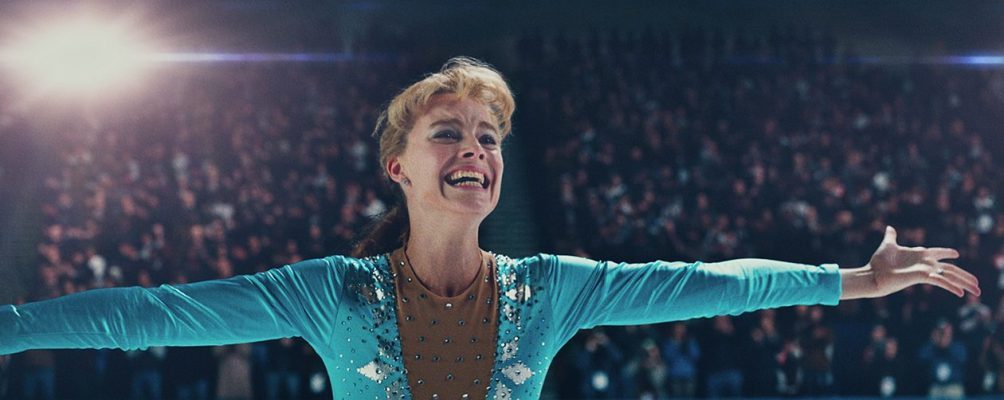| Worth seeing: | for the visceral over-heating relationship of the bullying Allison Janney and the tragic Margot Robbie |

| Director: | Craig Gillespie |
| Featuring: | Margot Robbie, Sebastian Stan, Allison Janney, Alphie Hyorth, Anthony Reynolds, Bobby Cannavale, Caitlin Carver, Julianne Nicholson, Lynne Ashe, Maizie Smith, McKenna Grace, Paul Walter Hauser, Ricky Russert |
| Length: | 119 minutes |
| Certificate: | 15 |
| Country: | US |
| Released: | 23rd February 2018 |
WHAT’S IT ABOUT?
In early 1970s Oregon, a somewhat fearsome, chain-smoking monster LaVona (Allison Janney) wouldn’t accept “no” for an answer when ice-skating coach Diane Rawlinson (Julianne Nicholson) said her daughter Tonya Harding was too young to train.
Over the years that follow, Tonya (Margot Robbie) rises up the ranks and starts pushing for Olympic contention.
With her mother shamelessly bullying her in public and her husband Jeff Gillooly (Sebastian Stan) beating her in private, Tonya is determined to prove herself to the world, despite the abuse she faces on and off the ice.
But however well she performs, a perceived snobbery from the sport’s organisers to her blue-collar background means she never manages to achieve her full potential.
Jeff might indulge in a little violence at home, but he’d argue that this doesn’t mean he loves her any less – and as a sign of that love, he does at least seem to be the only person who wants her to succeed. He even comes up with a plan to try to frighten Tonya’s main rival in the American championships, Nancy Kerrigan (Caitlin Carver).
But when Jeff’s friend Shawn (Paul Walter Hauser) gets a little carried away with the plan, the precociously talented ice-skater finds herself increasingly in hot water.
WHAT’S IT LIKE?
Anyone whose memory can reach back as far as the early 1990s will recall the Harding-Kerrigan controversy, but if you don’t remember the details, this biopic very deliberately won’t help you too much with the details. Presented as a combination of reconstructed interviews and more traditional narrative, with the characters occasionally turning directly to the audience, this film makes clear that no-one is really a particularly reliable narrator.
They all have their agenda and they certainly all have their axe to grind.
Regardless, there’s only ever one character who really earns our sympathy and that’s the eponymous Tonya, thanks to Margot Robbie’s determined and spirited performance. Watching the world – from her nearest and dearest outward – conspire, intentionally or otherwise, to crush this truly talented hope is heart-breaking.
As a mother-daughter pairing, Tonya and LaVona are far more explosive, fascinating and tragic than the characters at the heart of last week’s Lady Bird – something made all the more powerful by the fact that this tale is based on reality – or at least several versions of it.
The story is entertaining and well told – its unconventional and sometimes challenging structure is surprisingly clear to follow, thanks to tight direction, effects so convincing that you’ll believe that Margot Robbie can do the triple-axel, and strong performances, without exception.
Allison Janney has deservedly been sweeping up awards and is the favourite for next month’s Oscars, for her particularly impressive turn as a bile-spouting, hate-filled witch, although it’s never quite clear what drives her apparent hatred for and frustration with her daughter. She seems to moan that she spends all her money on Tonya’s skating but then seems determined to undermine her and gloat over her failure at every opportunity, sometimes – but not always – because she sees that Tonya is driven by anger.
Sebastian Stan is surprisingly sympathetic as a wife-beater, perhaps a strength of Robbie’s own performance as a woman who knowingly goes back for more because she, perhaps, sees something under the surface that no-one else can.
As the true harbinger of doom, Paul Walter Hauser, is perhaps the most frightening character – not least when you compare him to the real-life interview excerpts shown over the closing credits. Having concluded that no-one could be that perverse and lacking in self-awareness – it’s shocking to see how accurately he reflects the real Shawn.
It’s slightly disappointing, when a story centres so strongly on a single character, not to come out feeling slightly more optimistic. Usually, such stories are about someone succeeding against the odds – and, spoiler alert, this woman didn’t collect Olympic gold.
What actually did happen to her – and it’s revealed in captions at the end – makes this, peculiarly, one of the most enjoyably compelling, viscerally anarchic and entertainingly nihilistic films you’ll see for a while.
